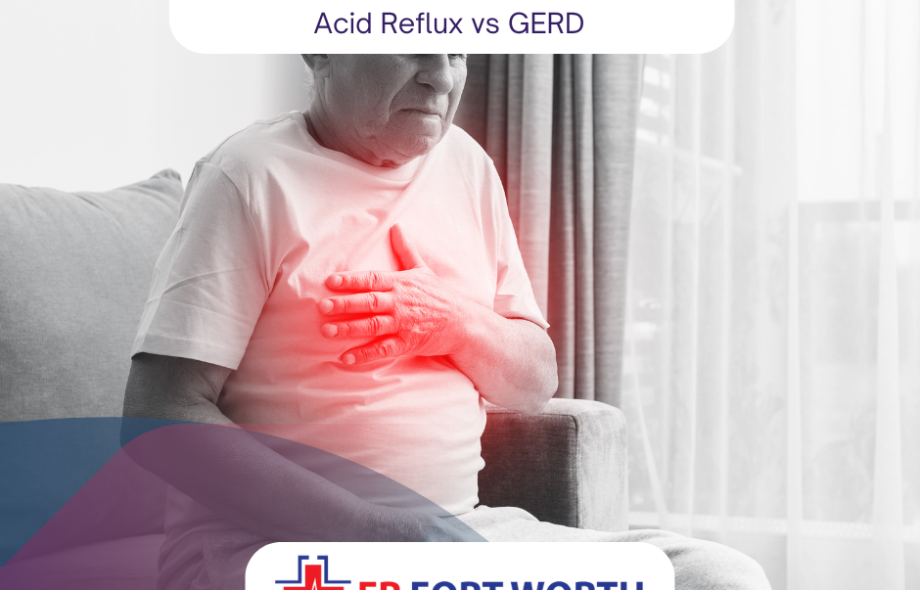Heartburn vs Chest Pain: 9 Critical Differences You Must Know
When you feel discomfort in your chest, it can be confusing and even frightening. Many people wonder if it’s heartburn or a sign of a heart problem. Understanding heartburn vs chest pain is extremely important, as one may be harmless and the other life-threatening. Knowing the difference can help you act quickly, get the right treatment, and avoid unnecessary stress.
In this guide, we’ll explore the causes, symptoms, risk factors, and treatment options for heartburn and chest pain, giving you a clear understanding of how to distinguish between the two.
OVERVIEW
-
Heartburn usually results from acid reflux, felt as a burning sensation behind the breastbone.
-
Chest pain may be related to the heart, lungs, muscles, or digestive system.
-
Key differences include location, triggers, type of pain, and seriousness.
-
Seek emergency care if chest pain is severe, sudden, or spreads to arms, neck, or jaw.
-
ER OF FORT WORTH provides 24/7 emergency care for chest pain and other urgent symptoms.
What Is Heartburn?
Heartburn is a burning feeling in the chest caused by stomach acid moving up into the esophagus. It is a symptom of acid reflux and is often mistaken for a heart-related issue.
Key Features of Heartburn:
-
Burning sensation behind the breastbone
-
Usually occurs after eating spicy, fatty, or acidic foods
-
Worsens when lying down or bending over
-
May be relieved by antacids
What Is Chest Pain?
Chest pain refers to any discomfort or pressure felt in the chest area. Unlike heartburn, chest pain can have many possible causes, some of which are very serious.
Possible Causes of Chest Pain:
-
Heart-related (heart attack, angina)
-
Lung-related (pneumonia, pulmonary embolism)
-
Digestive (ulcer, gallbladder issues)
-
Muscle or bone strain
Heartburn vs Chest Pain: The 9 Major Differences
| Type of Sensation | Burning, rising feeling | Pressure, tightness, squeezing |
| Location | Center of chest, moves up throat | Center or left chest, may spread to arms, back, neck |
| Trigger | Food, lying down, bending | Physical activity, stress, heart disease |
| Relief | Antacids, sitting upright | Rest, nitroglycerin (for angina) |
| Duration | Minutes to hours | Can be sudden or persistent |
| Associated Symptoms | Sour taste, bloating | Sweating, nausea, shortness of breath |
| Danger Level | Usually mild, non-life-threatening | Can be life-threatening |
| Time of Occurrence | After meals, at night | Anytime, often during exertion |
| Response Needed | Lifestyle changes, OTC meds | Emergency care required |
When to Worry: Signs Chest Pain Is an Emergency
Not all chest pain is heartburn. If you experience any of the following symptoms, call 911 or visit ER OF FORT WORTH immediately:
-
Sudden, crushing chest pain
-
Pain spreading to jaw, neck, or arms
-
Shortness of breath
-
Cold sweats
-
Dizziness or fainting
Common Triggers of Heartburn
-
Spicy or greasy foods
-
Chocolate, caffeine, or alcohol
-
Large meals before bed
-
Smoking
-
Obesity
Quick Tips to Reduce Heartburn:
-
Eat smaller meals
-
Avoid lying down after eating
-
Limit alcohol and caffeine
-
Maintain a healthy weight
How Doctors Diagnose the Difference
Because heartburn and cardiac chest pain can feel similar, doctors use different methods to tell them apart:
-
Electrocardiogram (ECG): To check for heart problems
-
Blood Tests: To look for signs of a heart attack
-
Endoscopy: To view esophagus and stomach for acid reflux damage
-
Chest X-ray: To rule out lung issues
Treatment Options
For Heartburn:
-
Over-the-counter antacids
-
Acid reducers (H2 blockers, proton pump inhibitors)
-
Lifestyle modifications
For Chest Pain (Cardiac):
-
Emergency evaluation
-
Blood thinners, clot-busting drugs
-
Angioplasty or stent placement
-
Long-term heart medications
Heartburn vs Chest Pain in Different Age Groups
Younger Adults
-
More likely to experience acid reflux
-
Less likely to have heart disease, but not risk-free
Middle-Aged and Older Adults
-
Increased risk of heart disease
-
Any chest discomfort should be checked urgently
ER OF FORT WORTH: Your Trusted Emergency Care
At ER OF FORT WORTH, we understand how frightening chest pain can be. Our emergency physicians are available 24/7 to provide immediate testing, diagnosis, and treatment. Whether it’s heartburn-related discomfort or a potential heart emergency, our team ensures you get the right care without delay.
FAQs
1. Can heartburn feel exactly like chest pain from a heart attack?
Yes, sometimes they feel very similar. That’s why it’s important not to ignore chest discomfort and get evaluated.
2. How do I know if it’s just heartburn?
If the burning is related to meals, relieved by antacids, and doesn’t spread to other areas, it’s more likely heartburn.
3. When should I go to the ER?
If your chest pain is sudden, severe, or comes with sweating, dizziness, or shortness of breath, go to the ER immediately.
4. Can stress cause chest pain?
Yes, stress and anxiety can trigger chest pain that mimics heart-related issues.
5. Should I take antacids if I’m not sure what’s causing the pain?
You can try, but never rely only on antacids. If symptoms persist, seek emergency help.
Conclusion
Knowing the difference between heartburn and chest pain could save your life. While heartburn is uncomfortable, chest pain can point to serious heart or lung issues. Always take chest discomfort seriously and seek immediate help if symptoms are severe. Remember, ER OF FORT WORTH is always ready to provide expert emergency care.



 :
:









